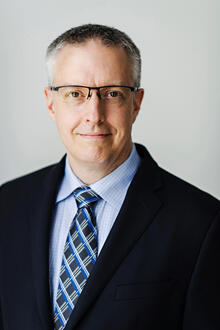Political scientist Daniel Henstra speaks to AMO on how Ontario municipalities can prepare for climate impacts
By Jon Parsons, University Relations
Climate change is such a huge issue that it can be difficult to even know where to start.
It involves sophisticated science and mountains of data, as well as social, political and economic implications that intersect with various academic disciplines.

Henstra is set to give a keynote address at the Association of Municipalities of Ontario (AMO) conference, an annual gathering of municipal leaders and administrators.
Daniel Henstra,Professor, Department of Political Science, Climate Risk Research Group Co-lead and Water Institute Member
Part of his research focuses on what he says are the front lines of climate change: the municipal and regional governments that are facing tough decisions today about how to prepare for worsening climate change tomorrow.
“Climate change is happening and it’s not going to stop,” says Henstra. “I’m working on what we can do to adapt to that reality and build resilience.”
Global and local
With so much focus on international bodies like the Intergovernmental Panel on Climate Change (IPCC), it is easy to forget it is municipalities that are on the ground and incorporating a future of climate change into their policies.
“It can be a real challenge for municipalities,” Henstra continues. “They must, by necessity, prioritize certain things over others. So much of the focus is on impacts they are seeing now, like for storm water sewers systems, roads and bridges. That is all important. But there are so many other programs that municipalities run that they should also examine through this lens of climate resilience.”
Part of Henstra’s message is that municipalities need to prioritize what he calls “adaptation investments,” and to think strategically even about things like the engineering and landscaping of recreational facilities.
He gives the example of a soccer pitch, which could be constructed with surrounding berms so that one day if needed, it could act as a holding pond for excess rainfall or drainage from the surrounding neighbourhood.
In this sense, Henstra sees building climate resilience as not just a matter of infrastructure like sewers and retaining walls, but also of social and cultural venues and of public services more generally. It is an approach that assumes climate change adaptation needs to be foregrounded in most policy decisions going forward.
“One area where municipalities have strengths is that they control some of the most important levers for making communities more resilient,” he says. “They control planning and development, where development is going to happen, the density of development. And that’s going to be crucial for making sure we are ready for a warmer and wetter world.”
University of Waterloo and municipal partnerships
Henstra also sees universities as a ready partner for municipalities as they plan and implement climate change resilience strategies. Such partnerships are already happening in both formal and informal ways and are set to become even more important.
“It could be with things like the rich data for modelling or the sophisticated scientific reports,” he says. “Municipalities may need someone who can collect and interpret the data. Our Waterloo researchers with expertise in climate data analysis can step in.”
Researchers working on policy and on a variety of interdisciplinary approaches to climate change will also be in demand, potentially working with municipalities to guide decision-making.
Henstra sees the university’s role as especially useful to small and medium-sized municipalities, which unlike huge municipalities like Toronto may not have their own dedicated staff or teams with a climate adaptation file.
“We expect to see, as well, that smaller municipalities may get together in regional associations to look at building resilience, and here the university can be a big help.”
He points out that the University of Waterloo already has the Waterloo Climate Institute, which hosts world-class experts and a wealth of resources that municipalities can access and use in their planning.
“The more we have people in the municipalities talking about climate change regularly in their work, it keeps it on the agenda and becomes a reflexive consideration alongside things like equity and economic development,” Henstra continues.
“Climate change needs to be another lens that is layered on everything municipalities do, and the University of Waterloo is prepared to support municipalities with building capacity and resilience.”
Henstra’s talk, “Adapting to Climate Change: Local Government Tools to Build Climate Resilience,” will be delivered during the AMO conference in Ottawa, August 14 to 17.